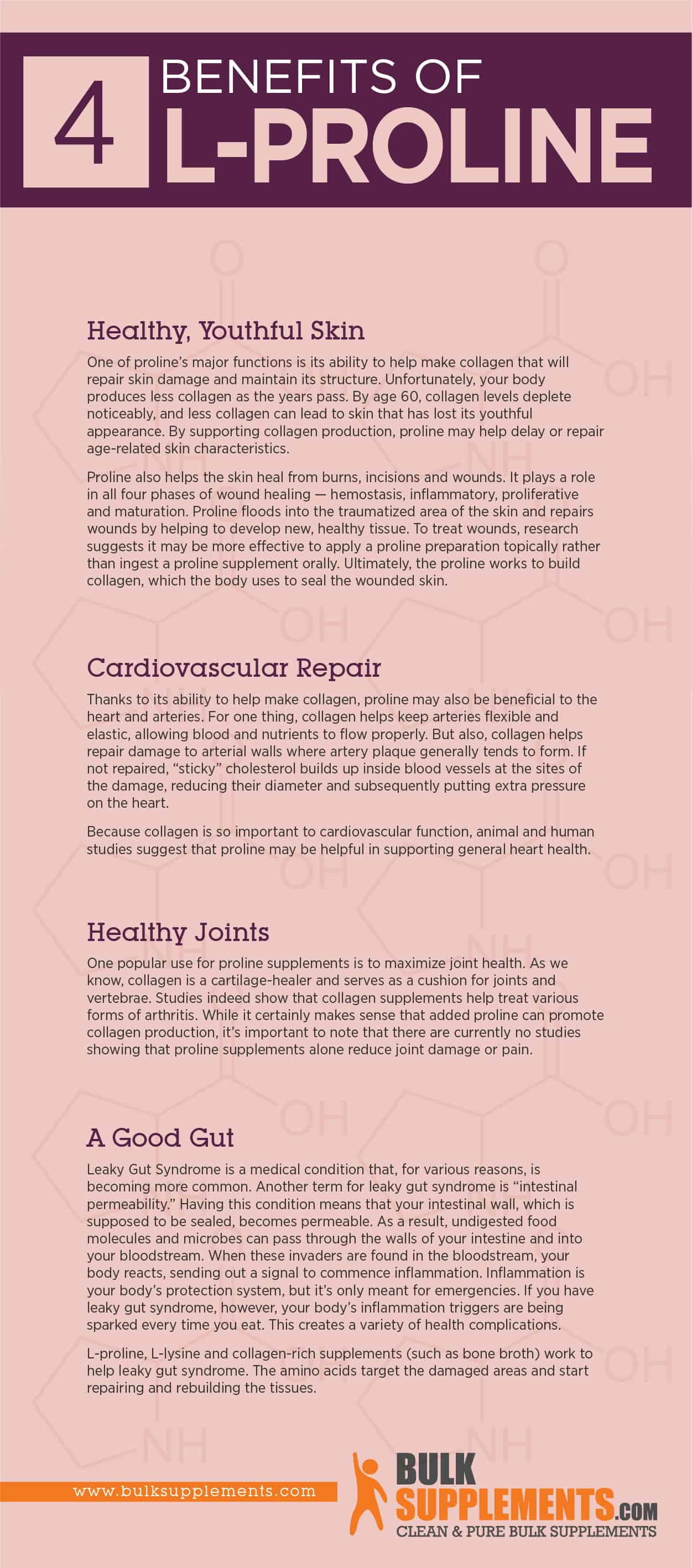L-Proline: Benefits, Side Effects & Dosage
by James Denlinger Digital Marketing StrategistWhat is L-Proline?
L-proline is an amino acid. Actually, scientists call it an “imino acid” or a “secondary” amino acid because of its unique chemical bonding structure. L-proline can be produced internally without relying on foods and supplements. Because of this, it’s considered a “non-essential” amino acid.
But the “secondary” and “non-essential” labels don’t mean L-proline is unimportant — quite the opposite. L-proline is a highly useful component that plays a crucial role within the human body.
What does it mean to be an amino acid, anyway? In general, amino acids are building blocks of proteins, enzymes, brain neurotransmitters and hormones. Just like other amino acids, L-proline (or proline for short) can be found in virtually every protein in the body. Proline is produced within the body and is also found in protein-rich foods. It can also be taken in supplemental form.
Proline is necessary because it helps repair and build tissue, maintain healthy skin, ease joint pain and promote healthy circulation.
L-Proline Benefits
We can’t have a proper discussion about proline without first talking about collagen. Proline is an essential ingredient in collagen. In fact, it makes up about 15 percent of it. Why is collagen so important? It’s the building block of tendons, bones, connective tissue and skin. Eating protein-rich foods can increase proline and collagen levels, as can supplements.
Healthy, Youthful Skin
One of proline’s major functions is its ability to help make collagen that will repair skin damage and maintain its structure. Unfortunately, your body produces less collagen as the years pass. By age 60, collagen levels deplete noticeably, and less collagen can lead to skin that has lost its youthful appearance. By supporting collagen production, proline may help delay or repair age-related skin characteristics.
Proline also helps the skin heal from burns, incisions and wounds. It plays a role in all four phases of wound healing — hemostasis, inflammatory, proliferative and maturation. Proline floods into the traumatized area of the skin and repairs wounds by helping to develop new, healthy tissue. To treat wounds, research suggests it may be more effective to apply a proline preparation topically rather than ingest a proline supplement orally. Ultimately, the proline works to build collagen, which the body uses to seal the wounded skin.
Cardiovascular Repair
Thanks to its ability to help make collagen, proline may also be beneficial to the heart and arteries. For one thing, collagen helps keep arteries flexible and elastic, allowing blood and nutrients to flow properly. Also, collagen helps repair damage to arterial walls where artery plaque generally tends to form. If not repaired, “sticky” cholesterol builds up inside blood vessels at the sites of the damage, reducing their diameter and subsequently putting extra pressure on the heart.
Because collagen is so important to cardiovascular function, animal and human studies suggest that proline may be helpful in supporting general heart health.
Healthy Joints
One popular use for proline supplements is to maximize joint health. As we know, collagen is a cartilage-healer and serves as a cushion for joints and vertebrae. Studies indeed show that collagen supplements help treat various forms of arthritis. While it certainly makes sense that added proline can promote collagen production, it’s important to note that there are currently no studies showing that proline supplements alone reduce joint damage or pain.
A Good Gut
Leaky Gut Syndrome is a medical condition that, for various reasons, is becoming more common. Another term for leaky gut syndrome is “intestinal permeability.” Having this condition means that your intestinal wall, which is supposed to be sealed, becomes permeable. As a result, undigested food molecules and microbes can pass through the walls of your intestine and into your bloodstream. When these invaders are found in the bloodstream, your body reacts, sending out a signal to commence inflammation. Inflammation is your body’s protection system, but it’s only meant for emergencies. If you have leaky gut syndrome, however, your body’s inflammation triggers are being sparked every time you eat. This creates a variety of health complications.
L-proline, L-lysine and collagen-rich supplements (such as bone broth) work to help leaky gut syndrome. The amino acids target the damaged areas and start repairing and rebuilding the tissues.
 PIN IT
PIN ITL-Proline in Food
Eating a diet rich in protein and collagen will give your body an excellent source of proline. Beef, liver, lamb, poultry, eggs and fish are superb high-protein sources. Because of the collagen levels in gelatin, this is also a good source of L-proline. Cottage and cream cheeses contain L-proline, too.
Eating bone broth is a popular way to boost amino acid and collagen intake. Bone broth can be made using this simple recipe:
- Place 5 pounds of meaty beef bones in a large stock pot. Add ½ cup raw apple cider vinegar and 4 quarts water, and let the mixture sit for one hour.
- Add more water if needed to cover the bones.
- Put in 3 cups each of onions, celery and carrots. Bring to a boil. Skim the scum and foam from the top and discard.
- Reduce to a low simmer, cover and cook for 24-72 hours. Or, cook overnight in a slow cooker.
- Add a handful of parsley for extra minerals and flavor.
- Cool and strain the broth, making sure all marrow is added into the broth.
- Add sea salt to taste and enjoy.
Those following a plant-based diet can also find L-proline in foods such as cabbage, asparagus, cucumber, beans and wheat.
L-Proline Dosage & Side Effects
Other than food sources, L-proline is available in powder and capsule form. There is no standard recommended dose for proline supplements. Take as directed on the product package, or as directed by a physician.
If you have liver or kidney disease, consult your doctor before taking any amino acid supplement.
The Bottom Line
We say amino, scientists say “imino.” But either way, L-proline is a busy chemical in the body. It works together with other amino acids and vitamin C to form collagen that helps build tissues, and it’s always on the alert for body repairs. Blood vessels, intestinal lining, joints and skin are all target areas that benefit from proline.
Proline is easily manufactured within the body when a person’s diet contains adequate protein, and vitamin C eases its absorption. Conditions such as arteriosclerosis, joint pain, leaky gut, skin issues and demanding sports routines may benefit from a proline boost. Drinking bone broth, adding protein-packed foods or taking a supplement are all ways to ensure you are getting enough. Whichever way you get it, proline seems to be an essential piece of the body’s puzzle.
Sponsor Ads
Created on Apr 4th 2020 14:59. Viewed 351 times.




